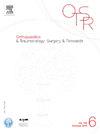洛沙坦钾处方与全膝关节置换术后疗效之间的关系:TriNetX 分析。
IF 2.3
3区 医学
Q2 ORTHOPEDICS
引用次数: 0
摘要
背景:全膝关节置换术(TKA)是一种常见的外科手术,目的是减轻保守治疗失败的膝关节骨性关节炎和类风湿性关节炎患者的疼痛并改善其功能。由于关节纤维化对 TKA 效果有负面影响,因此对其进行了广泛的研究。血管紧张素受体阻滞剂(ARB)洛沙坦有可能通过抑制 TGF-β 和减少纤维化来改善 TKA 的预后。本研究旨在分析大规模真实医疗数据库,调查洛沙坦钾处方与术后结果(如再入院率、急诊就诊率、MUA或翻修TKA需求)之间的关联:假设:根据以往的文献和 ARBs 的性质,预计添加洛沙坦钾将有助于改善初次 TKA 患者的预后:在这项回顾性观察研究中,我们查询了截至 2023 年 6 月 21 日的 TriNetX 研究网络(TriNetX)数据库。所有在2022年6月21日之前接受过初级全膝关节置换术(TKA)的患者都被纳入其中。然后根据患者在手术前一年至术后 90 天内是否服用过洛沙坦钾处方将其分为两个组群。然后对患者进行倾向匹配,以消除人口统计学和合并症方面的差异:洛沙坦 TKA 患者在术后 90 天内再次入院的可能性降低了 1.18 倍(OR:0.85 (95% CI:0.79, 0.90),p < 0.001),在术后 1 年内接受麻醉操作 (MUA) 的可能性降低了 1.15 倍(OR:0.87 (95% CI:0.79, 0.96),p = 0.009)。术后90天的急诊室就诊率和术后1年的翻修TKAs率在统计学上没有显著差异:总之,与未服用洛沙坦的患者相比,TKA 术前服用洛沙坦的患者在术后 90 天内再次入院的可能性明显较低,术后 1 年内接受 MUA 的可能性也较低。这为进一步临床研究提供了机会,以探索洛沙坦在TKA中的价值:证据级别:III;观察性队列研究。本文章由计算机程序翻译,如有差异,请以英文原文为准。
The association between losartan potassium prescription and postoperative outcomes following total knee arthroplasty: A TriNetX analysis
Background
Total knee arthroplasty (TKA) is a common surgical procedure performed to alleviate pain and improve functional outcomes in patients with knee osteoarthritis and rheumatoid arthritis who have failed conservative treatments. Arthrofibrosis has been extensively studied due to its negative impact on TKA outcomes. Losartan, an angiotensin receptor blocker (ARB), has the potential to improve TKA outcomes by inhibiting TGF-β and decreasing fibrosis. This study aims to analyze a large-scale, real-world healthcare database to investigate the association between losartan potassium prescription and postoperative outcomes such as readmissions, ED visits, and the need for MUA or revision TKA.
Hypothesis
Based on previous literature and the nature of ARBs, it is expected that the addition of losartan will aid in better outcomes for patients following a primary TKA.
Patients and methods
In this retrospective observational study, the TriNetX Research Network (TriNetX) database was queried as of June 21, 2023. All patients who underwent a primary total knee arthroplasty (TKA) prior to June 21, 2022 were included. Patients were then divided into two cohorts by whether they had an active losartan potassium prescription within the year prior to their surgery to within 90 days postoperatively. Patients were then propensity-matched to eliminate differences in demographics and comorbidities.
Results
Losartan TKA patients were 1.18 [OR: 0.85 (95% CI: 0.79–0.90), p < 0.001] times less likely to be readmitted within 90 days and were 1.15 (OR: 0.87 (95% CI: 0.79–0.96); p = 0.009) times less likely to undergo a manipulation under anesthesia (MUA) within the 1-year postoperative period. There were no statistically significant differences in rates of emergency department (ED) visits at 90 days postoperatively or revision TKAs at 1 year postoperatively.
Discussion
In conclusion, patients with an active losartan prescription prior to TKA had a significantly lower likelihood of readmission within 90 days and a lower likelihood of undergoing MUA within the 1-year postoperative period compared to patients not taking losartan. This presents an opportunity for further clinical investigation to explore the value of losartan in TKA.
Level of evidence
III; an observational cohort study.
求助全文
通过发布文献求助,成功后即可免费获取论文全文。
去求助
来源期刊
CiteScore
5.10
自引率
26.10%
发文量
329
审稿时长
12.5 weeks
期刊介绍:
Orthopaedics & Traumatology: Surgery & Research (OTSR) publishes original scientific work in English related to all domains of orthopaedics. Original articles, Reviews, Technical notes and Concise follow-up of a former OTSR study are published in English in electronic form only and indexed in the main international databases.

 求助内容:
求助内容: 应助结果提醒方式:
应助结果提醒方式:


